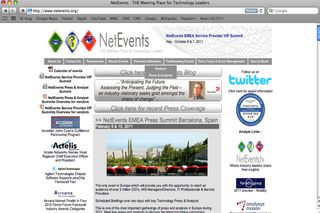NetEvents 2011: News roundup
This week, IT decision makers descended on Barcelona for NetEvents. We bring you all the hot topics from the telecoms and networking event.

Slotted nicely in between Cisco Live and Mobile World Congress, NetEvents 2011 brought together a number of leading telecoms and networking companies to talk through the trends of an ever-growing industry.
IT PRO attended the event so here's a round-up of the hot topics on the lips of industry insiders.
IPv6 gets real
The need to migrate to IPv6 has been touted for around 15 years now but at NetEvents, executives accepted this time the need was real.
The last of the IPv4 addresses have been sold and there is nowhere left to go for companies other than to move to IPv6.
During the event, Steve Garrison, the head of marketing for Infoblox, warned businesses their networks could be "hexed" if they did not prepare for IPv6.
He claimed firms needed to start examining their gateways first as, even if they weren't using IPv6 inside their data centres yet, external service providers were sure to be.
Get the ITPro. daily newsletter
Receive our latest news, industry updates, featured resources and more. Sign up today to receive our FREE report on AI cyber crime & security - newly updated for 2024.
"Within an enterprise, you can create your own address pool anyway but when you go out into the wider area network other service providers are using IPv6 so you will see IPv6 packets coming in," said Garrison.
"Service providers are doing it now so the enterprise needs to look. It does depend on how much you leverage your service provider but you will need to begin thinking about it."
However, he stuck with the line of "thinking about it" rather than panicking and said the provocative reports scaring companies were not necessary.
"No planes will fall from the sky [and] your iPhone will still connect to a network," he said.
"Should we all run to the store and buy new tools or be pragmatic? It has been 16 years coming and the address pool really has run out but customers must be [sensible] in this process and just think about it."
Seamless Wi-Fi? Unlikely
Increasingly, Wi-Fi is becoming the solution to many users' problems.
It works as a practical fallback when the mobile network fails, the number of hotspots gives solid connections in almost any location and whilst fixed lines cannot reach more remote areas, Wi-Fi can do the job.
However, even those who praise the technology have warned we will never reach a seamless system where users can smoothly transition from network to network.
During a debate at NetEvents, there was a panel consensus dismissing the notion of a seamless network, with Chris Cox, marketing manager at IP Access, claiming it would "always be slightly fragmented" and Natasha Tamaskar, vice president of product marketing at Genband saying: "It is something users will not want to accept... unless its seamless it is not good enough."
But Dean Bubley, founder of Disruptive Analysis, claimed the fragmented nature was necessary.
"Seams are boundaries and so are important," he said. "Although sometimes the users don't want to know about them, if something happened - a change in speed, price, security et al - the application needs to know about it, even if the user doesn't."
The message was clear: enjoy your Wi-Fi connectivity and expect improvements but let go of any aspirations for a seamless flowing between networks.
Jennifer Scott is a former freelance journalist and currently political reporter for Sky News. She has a varied writing history, having started her career at Dennis Publishing, working in various roles across its business technology titles, including ITPro. Jennifer has specialised in a number of areas over the years and has produced a wealth of content for ITPro, focusing largely on data storage, networking, cloud computing, and telecommunications.
Most recently Jennifer has turned her skills to the political sphere and broadcast journalism, where she has worked for the BBC as a political reporter, before moving to Sky News.





